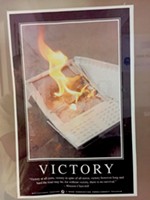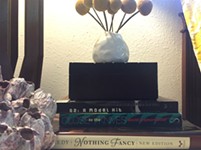Bedside Manner: Got Opium?
Getting High and Low with Steven Martin, Nick Tosches, et al
By Marc Savlov, 3:43PM, Mon. Jul. 23, 2012
"Though I always wanted to be an opium addict, I can't claim that as the reason I went to China." -- Emily Hahn, "The Big Smoke," The New Yorker, February 15, 1969.
So much time, so little opium, right? Or is that so little time and even less opium? I'm not sure, but as a literary subject, the dope's one-hundred percent killer.
These sultry days and sodden nights, Texas is beginning to look more like a cross between Oklahoma, circa 1934, pre-moisture farmed Tattooine, and certain sequences from Jeff Nichols' Take Shelter that the lush Hill Country of my youth. All this hot hot heat gives me a yen for mad escape into dragon-tailed dreams coiling and uncoiling betwixt freshly tussled bedclothes. Honestly, I could totally go for a deep draught of old school opium right about now.
But no, as Steven Martin points out in his eminently readable and highly personal new memoir Opium Fiend (2012, Villard), here in America, the feds, even vigilant in their fight against foreign vices and readily available fun, officially outlawed the poppy-based narcotic via the Harrison Narcotics Tax Act of 1914.
"She messed around with a bloke named Smoky/She loved him though he was cokey/He took her down to Chinatown/And showed her how to kick the gong around" -- "Minnie the Moocher" by Cab Calloway
That law, following decades after the British flooded Qing Dynasty China with opium-for-tea trading under the auspices of the British East India Company, did away with even the heavily diluted, almost always impure opium that had led to those cramped and grimy dens we've all seen photos of. Buzzkillers.
Martin, himself a respected collector of opium smoking paraphernalia -- beautiful teak and ivory pipes often inlaid with jade and silver filigree ornamentation -- tells of his own yen for Jean Cocteau's favored method of enlightenment. A longtime journalist and writer, he describes his meandering quest throughout China, Thailand, Laos, and Vietnam in search of the perfectly rolled opium pill with worldly humor and infinitesimal detail.
His adventures under opium's spell are wildly appealing, and his prose often escalates into the dreamlike without becoming a zen-den yawn. Over the course of the book, he relates how 15 years of research and discovery eventually, cunningly, turned him into an addict, smoking up to 20 pipes a day by the end. Turns out getting there was all the fun. The preparation for and smoking of opium, like some phantasmal religion, is full of deeply nuanced ritual and, dare we day, artistic endeavor (with a dash of the Orientalist belle epoque).
Of course, it's also addictive, less so than its back alley opioid cousins heroin and morphine, but Martin, wisely, leads into the history of the drug with a heady accounting of one of his several hideous forays into withdrawal. Closeted in a sweaty little Bangkok rental, he's every bit the Mark Renton character from Trainspotting, minus the wall-crawling revenant infant.
It's a hard-knock life, for certain, but the yellow peril -- actually a blackish-brown paste -- gets kicked but good in the end. The author is left to ache for the romance of the gauzy once-was for the sober here-and-now, and we, the reader, are simultaneously enriched by his ordeal and jonesing for a long-ago lungful despite ourselves.
Quick read on a similar subject: Nick Tosches is an author and journalist so cracklingly good he could re-write the phone book as a doomily delicious noir and sell the rights to Hollywood before he even hit the letter "B." The Last Opium Den (2000, Bloomsbury) is his slim take on the the big O, and while much of the hard information in this 74-page is expanded upon in Martin's book, you don't read Tosches for just the facts, ma'am: you read Tosches because he's one of the best writers America has ever produces. Profoundly poetic, waxing lyrical like a febrile lover's blood-red moon, Tosches amps up the mood to druggy levels even Martin never (quite, but almost) matches. By far the best $40 I ever spent on eBay for a long out-of-print chapbook about poppy-love.
Your Poetry Sucks So Good Department: I discovered Pamela August Russell's B is For Bad Poetry (2009, Sterling) at pop-culture nexus Guzu a while back and fell in love with it even before I popped the fat man behind the counter a sawbuck. Sample: "Film Noir Haiku," "I'm rich and you cheat/With me dead the money's yours/Soon my brakes will fail." Sample the second: "Subterranean Abstraction," In Hell,/just before lunch/Gandhi is waving/a gun around/demanding a steak."
Screw opium. I want some of that.
More Tosches: King of the Jews: The Greatest Story Never Told (2005, Harper/Perennial) tells the story of badass Hebrew Meyer Wolfsheim Nathan Detroit Arnold Rothstein, the mobster who fixed the 1919 World Series (apparently) and blackened the Chicago Black Sox right out of the park and into eternal infamy. Only Tosches would kick off a grifty bio with an deep-core examination/explanation/scholarly discourse on God, and how the original text of the Old Testament refers, in Hebrew obviously, of not one God but a plurality. Take that, King James. But I, and Tosches, digress. He's better at it than me, and Rothstein's improbable rise from immigrant street hood to king of the world, almost but not quite, is smart, edgy New Yawk history and more fun that kicking an old lady in a wheelchair down a flight of stairs.
Yet more Tosches: Although here, he only sets the stage and provides an introduction -- witty, knowledgeable, horrific -- to the New York Review of Books 2010 re-issue of alcoholic-author-suicide-hyphenate William Lindsay Gresham's 1946 novel of utter, total, complete fucking despair, Nightmare Alley, in which the innate squalidity of the itinerant American carnival and the carnies that populate it to this day is revealed to be psychologically twisted, morally bankrupt, sexually perverse and perversely thirsty, and huzzah for all that, say I. Frankly, I can't think of anything more American than this human train wreck of misguided optimism.
It's a backhanded slap to the dark underbelly of your country, 'til of thee, and a sucker punch-drunk dunk into the psych ward that was Gresham's headspace. Remarkably, the novel hit the screen as one of the first film noirs, one year after being published, with Tyrone Power and Joan Blondell getting all hot and bothered and freaky-geeky with each other and scalding the audience in the process. Both versions are priceless visions of Americana gone gutter-green. Love it or leave it or stick a fork in it; it's done, baby, done, and so am I.
A note to readers: Bold and uncensored, The Austin Chronicle has been Austin’s independent news source for over 40 years, expressing the community’s political and environmental concerns and supporting its active cultural scene. Now more than ever, we need your support to continue supplying Austin with independent, free press. If real news is important to you, please consider making a donation of $5, $10 or whatever you can afford, to help keep our journalism on stands.
Kimberley Jones, June 22, 2016
Brandon Watson, June 22, 2016
Aug. 7, 2022
April 29, 2022
Bedside Manner, opium, Nick Tosches, Steven Martin, Pamela August Russell











